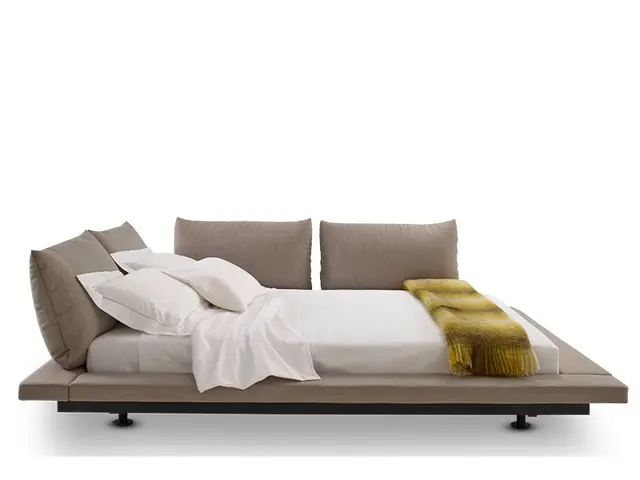Dissecting the Snore: Unveiling the Culprits and the Cures
Strategies to Eliminate Snoring: Exploring Remedies, Gadgets, and Solutions
Snoring is a common annoyance that can disrupt your sleep and your relationship if left unattended. It's the aggravating symphony of noises made when air can't smoothly flow through your throat and nose during slumber, causing the surrounding tissues to vibrate.
There's a cast of characters contributing to this nightly performance:
- Obstructionist Actors: People who snore more often have an overabundance of throat and nasal tissue, or floppy tissue that vibrates too much. Your tongue's position can also play a disturbing role.
- Aging Dramatists: As we journey through our golden years, our throats become narrower, and the muscle tone decreases.
- Weighty Role Players: If you're carrying excess weight, particularly around the neck or throat, it can lead to snoring.
- Genetic Stagehands: The way you're built and men being more likely to have narrower air passages due to their gender are often inherited traits.
- Blocked (Nasal and Sinus) Producers: Breathing problems like a stuffy nose or a deviated septum can cause a vacuum in the throat, initiating that familiar snoring sound.
- Liquored-up Performers: Alcohol, smoking, and certain medications can over-relax the throat muscles, leading to more vibrations and snoring.
- Slumbering Posturing Artists: Sleeping on your back can relax the throat tissues and block the airway.
If snoring bothers you frequently, it could not only disrupt your sleep, but also lead to daytime sleepiness, irritability, high blood pressure, and increased health problems. It may even cause significant relationship strain if you share your bed with someone.
But before you reach the point of sleeping alone or creating major marital problems, there are effective solutions to help you and your partner rejoice in a calm, quiet, restful night. Let's take a curtain call with these remedies:
Sleep Aids
- Anti-Snore Pillows: To alter your sleeping position, utilize a specialized pillow that encourages the tongue and jaw to move forward.
- Adjustable Beds: The inclined position of an adjustable bed can bring respite from snoring. A split king adjustable bed allows partners to tinker with their own sleeping positions.
- Tennis Ball Tricks: Sleep on your side by using a tennis ball to deter yourself from sleeping on your back. Either sew a sock to the back of your top and stuff it with a tennis ball, or pin a tennis ball to the back of a pajama top or T-shirt. If you roll onto your back, the discomfort will inspire you to turn onto your side.
- Mouthguards: Devices that resemble an athlete's mouthguard can help open your airway by moving the lower jaw and tongue forward during sleep.
- Nasal Relief: If your nasal passages are blocked, using a neti pot, nasal decongestant, or nasal strips can make breathing more manageable while sleeping. If you have allergies, reduce dust mites and pet dander in your bedroom or use an allergy medication.
- Moisture Boost: Dry air can irritate membranes in the nose and throat, so a humidifier can ease the discomfort caused by swollen nasal tissues.
Lifestyle Adjustments
- Shedding Pounds: Even modest weight loss can decrease excess tissue in the back of the throat and put an end to (or at least significantly decrease) snoring.
- Quitting Smokes: If you are a smoker, your chances of snoring are high. Quitting smoking will ease the irritation of the throat and lead to quick snoring relief.
- Limiting Alcohol: Alcohol, sleeping pills, and sedatives can relax throat muscles in the throat, leading to more snoring.
- Modifying Diet: Consuming large meals or dairy products before bedtime can exacerbate snoring.
- Engaging in Exercise: Regular physical activity can reduce snoring, even if it doesn't produce weight loss. Strengthening the throat muscles can lead to less snoring.
Vocal Training
- Pitched Practice: By repeating each vowel out loud for three minutes a few times a day, you can strengthen the muscles in the upper respiratory tract, leading to less snoring caused by loose throat muscles.
- Tongue Travel: Place the tip of your tongue behind your top front teeth and slide it backwards for three minutes a day.
- Lip Firming: With your mouth open, hold the lips together for 30 seconds.
- Side Tilt: With your mouth open, move your jaw to the right and hold for 30 seconds. Repeat on the left side.
- Throat Curling: With your mouth open, contract the muscle at the back of your throat repeatedly for 30 seconds. You can observe the uvula ("the hanging ball") move up and down when looking in a mirror.
- Lively Performances: Singing can fortify muscle control in the throat and the soft palate, reducing snoring caused by floppy throat muscles.
Medical Interventions
If you haven't found relief through self-help strategies, don't despair. There are medical solutions at your disposal. New innovations in snoring treatments are constantly developed and devices are becoming increasingly effective and comfortable.
Talk to your primary care physician or an otolaryngologist (ear, nose, and throat doctor or ENT) about medical devices or surgical procedures such as:
- Continuous Positive Airway Pressure (CPAP): A machine at your bedside blows pressurized air into a mask that you wear over your nose or face to keep your airway open during sleep.
- Laser-assisted uvulopalatoplasty (LAUP): A laser shortens the uvula and makes small cuts in the soft palate either side, stiffening the tissue to prevent vibration-induced snoring.
- Palatal implants: Small plastic implants are inserted into the soft palate to prevent soft palate collapse and snoring.
- Somnoplasty: Low levels of radiofrequency heat are used to remove tissues of the uvula and soft palate, constricting them to reduce vibration-induced snoring.
- Custom-fitted dental devices and lower jaw-positioners: These devices help keep the airway open by moving the lower jaw or the tongue forward during sleep.
- Surgical procedures: Uvulopalatopharyngoplasty (UPPP), Thermal Ablation Palatoplasty (TAP), tonsillectomy, and adenoidectomy can increase the size of your airway by removing tissues or correcting abnormalities.
- Septoplasty: Corrects a deviated septum, which can cause snoring.
Snoring may disrupt your relationship, but collaborating with your sleep partner to discover the cause and implement the appropriate remedy could enhance your bond and forge a deeper connection. Communication, understanding, and patience are essential in this endeavor.
When addressing the issue with your partner, approach it sensitively, avoid taking it personally, and resist lashing out. Take the situation seriously, emphasize your commitment to the relationship, and address inappropriate behavior.
If you find support and the appropriate treatment, snoring doesn't have to derail your quality of life or relationships. If these solutions don't yield the desired results, consult a professional who can offer guidance and customized solutions catering to your needs.
Science suggests that mental health plays a role in sleep quality, as stress, anxiety, and depression can lead to sleep disturbances, including snoring. Regular practice of relaxation techniques such as meditation, deep breathing, or yoga may help manage stress levels and improve sleep quality, potentially reducing snoring.
Furthermore, maintaining good overall health-and-wellness, including a balanced diet, regular exercise, and adequate hydration, can contribute to better physical health and, by extension, better sleep health. Consequently, these habits may indirectly help reduce snoring.








